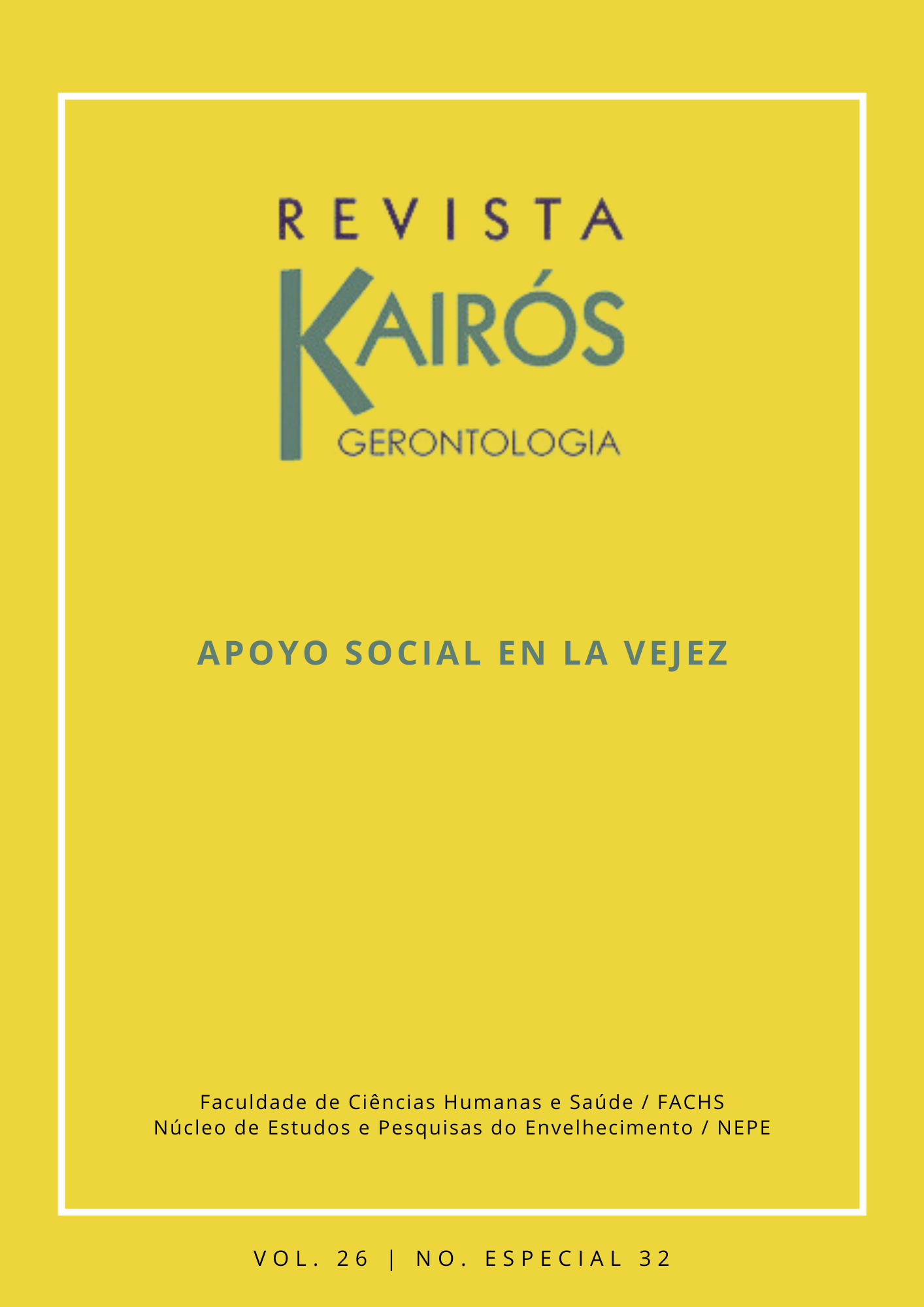La disponibilidad de apoyo social en la vejez
sumando vínculos y dispositivos
DOI:
https://doi.org/10.23925/2176-901X.2023.v26n32e62238Palavras-chave:
rede de apoio, apoio informal, pessoas idosas, apoio social formalResumo
O estudo do envelhecimento humano tornou-se um tema inevitavel na agenda pública mundial. O envelhecimento da população coloca novos desafios e exigências que obrigarão a mudanças e reajustamentos nos suportes sociais formais e informais aos idosos. Num contexto caracterizado pela emergência de novas necessidades e exigências, assume grande importância o reforço e articulação desses apoios. Com efeito, são essenciais para dar respostas adequadas às diversas situações que os idosos atravessam de acordo com as suas necessidades e recursos, tanto pessoais como familiares e comunitários. Organismos internacionais interessados na velhice e no envelhecimento têm destacado sua importância e a necessidade de os governos desenvolverem políticas que promovam e garantam o acesso a essas estruturas. Neste artigo, definem-se e exemplificam-se os suportes formais e informais, e faz-se uma breve descrição de cada uma das partes e artigos que compõem este número especial da revista. Globalmente, pretende-se abordar o apoio à disposição dos idosos que frequentam oficinas educativas, centros dia e que vivem em ILPIs na perspetiva de três intervenientes envolvidos: os idosos, as suas famílias e/ou os profissionais que trabalham neles. A produção de conhecimento sobre os recursos informais e formais de apoio disponíveis na velhice avançada, tanto para a vida cotidiana quanto para o enfrentamento de situações de mudanças e perdas, permitirá o desenvolvimento de práticas voltadas para a melhoria de suas condições de vida e promoção do bem-estar integral
Referências
Arias, C., Soliverez, C. & Bozzi Favro, N. (2020). El envejecimiento poblacional en América Latina. Aportes para el delineamiento de políticas públicas. Revista Eurolatinoamericana de Análisis Social y Político. RELASP 1 (2) 11-23.
Cafagna, G. , Aranco, N., Ibarrarán, P., Olivieri, M. & Medellin, N.(2019). Envejecer con cuidado: Atención a la dependencia en América Latina y el Caribe. Washington: BID
Canet-Juric, L., Andrés, M. L., Del Valle, M., López-Morales, H., Poó, F., Galli, J. I. & Urquijo, S. (2020). A longitudinal study on the emotional impact cause by the COVID-19 pandemic quarantine on general population. Frontiers in Psychology, 11, 2431.
CEPAL (2002). Recomendaciones para políticas sobre redes de apoyo social de personas adultas mayores. Santiago de Chile: Autor.
CEPAL (2004). Estrategia regional e implementación para América Latina y el Caribe del Plan de acción internacional de Madrid sobre el envejecimiento. Santiago de Chile: Autor.
CEPAL (2020). La pandemia del COVID-19 profundiza la crisis de los cuidados en América Latina y el Caribe. Recuperado de: https://www.cepal.org/es/publicaciones/45335-la-pandemia-covid-19-profundiza-la-crisis-cuidados-america-latina-caribe
Fernández Ballesteros, R., Izal, M., Montorio, I.; Gonzales, J.L. & Díaz Veiga, P. (1992). Evaluación e Intervención psicológica en la vejez. Barcelona: Martínez Roca.
Guzmán, J. M.; Huenchuan, S & Montes de Oca V. (2003). Redes de apoyo social de las personas mayores: marco conceptual. Notas de población año XXIX, Nº 77, CEPAL: Santiago de Chile.
INDEC (2012). Encuesta Nacional sobre Calidad de vida de adulos mayores 2012. ENCAVIAM, Serie Estudios INDEC N° 46. Recuperado de https://www.indec.gov.ar/ftp/ cuadros/sociedad/encaviam.pdf.
Leiva, A., M., Nazar., G., Martínez Sangüinetti, M. A., Petermann Rocha, F., Ricchezza, J., & Celis-Morales, C. (2020). Dimensión psicosocial de la pandemia: la otra cara del COVID-19. Ciencia y Enfermería, 26. Recuperado de https://revistasacademicas.udec.cl/index.php/cienciayenfermeria/article/view/2257
Naciones Unidas (1982). Plan de acción de Viena sobre el Envejecimiento. Nueva York: Autor.
Naciones Unidas (1998). Año Internacional de las Personas de Edad, 1999. Nueva York: Naciones Unidas.
Naciones Unidas (2002). Plan de Acción Internacional de Madrid sobre el Envejecimiento. Nueva York: Autor.
OEA (Organización de Estados Americanos). (2015). Convención Interamericana sobre la protección de los derechos humanos de las personas mayores. Washington: Autor.
Oliveri, M. L. (2020). Envejecimiento y atención a la dependencia en Argentina. Banco Interamericano de Desarrollo. División de Protección Social y Salud.
Organización Mundial de la Salud (2002). Envejecimiento Activo: Un marco político. Revista Española de Geriatría y Gerontología, 37 (S2), 74-105.
Rubinstein, S. (2012) Percepción de la función de apoyo social y nivel de satisfacción con la prestación en adultos mayores concurrentes al Programa Hogares de Día para Tercera Edad del Gobierno de la ciudad de Buenos Aires. Maestría en Gestión de Servicios Gerontológicos. Instituto Universitario ISALUD
Sandín, B., Valiente, R., García-Escalera, J., & Chorot P. (2020) Impacto psicológico de la pandemia de COVID-19: Efectos negativos y positivos en población española asociados al periodo de confinamiento nacional. Revista de Psicopatología y Psicología Clínica, 25 (1), 1-22. doi:10.5944/rppc.27569.
Sluzki, C. (1996). La red social: Frontera de la práctica sistémica. Barcelona: Gedisa.
Zambrano Quinde, O. R., Castillo Tigua, M. F., Meza Toala, E. V., Guale Flores, R. J., & Benitez Chavez, A. M. (2021). Implementación de una escala para medir “impacto psicosocial y actitudes en sujetos post COVID-19”. Estudio aleatorio en la ciudad de Manta entre abril y septiembre del 2020. Dominio de las Ciencias, 7 (2), 301-318.
Downloads
Publicado
Como Citar
Edição
Seção
Licença
Copyright (c) 2023 Revista Kairós-Gerontologia

Este trabalho está licenciado sob uma licença Creative Commons Attribution 4.0 International License. Kairós Gerontologia é detentora dos direitos autorais de todos os artigos publicados por ela. A reprodução total dos artigos desta revista em outras publicações, ou para qualquer outro fim, por quaisquer meios, requer autorização por escrito do editor deste periódico. Reproduções parciais de artigos (resumo, abstract, mais de 500 palavras de texto, tabelas, figuras e outras ilustrações) deverão ter permissão por escrito do editor e dos autores.


